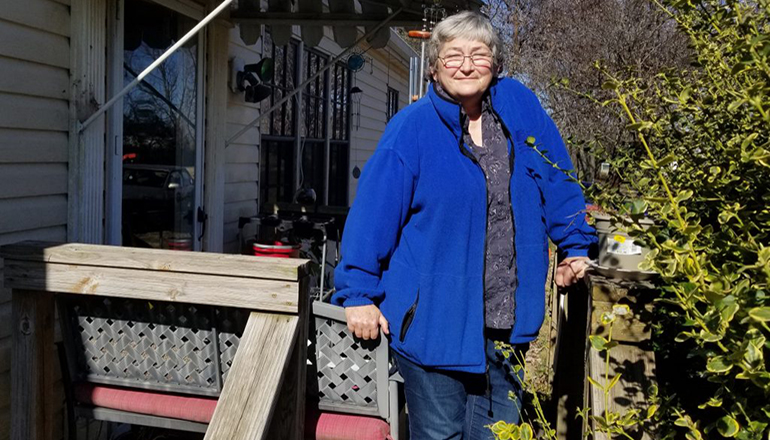(Missouri Independent) – An Edgar Springs woman won a partial victory Tuesday in her long-running dispute with her city when a judge ruled local officials violated her constitutional rights and the state’s Sunshine Law.
The small Phelps County city must pay Rebecca Varney a fine of $600 plus her legal costs for “knowing and purposeful” violations of the state Sunshine Law, Circuit Judge John Beger ordered. The city must also allow her to visit city hall when it is open to the public, Beger ruled, and inspect city records while there.
Beger granted Varney summary judgment on four of the nine specific allegations in the lawsuit she filed in November 2020. He ruled that her due process rights were violated when the city banned her from city hall without a chance to appeal the decision. Beger also found three separate violations of open records laws.
Her attorney, Dave Roland of the Freedom Center of Missouri, said he sent an email to the city’s attorney asking for possible trial dates for the remaining counts.
“I was thrilled to get that judgment,” Roland said.
In his ruling, Beger wrote that city officials had admitted many of the actions that Varney alleged in her lawsuit.
“The reason we pursued these four counts is we believe there was no legitimate dispute,” Roland said.
Edgar Springs’ attorney in the lawsuit did not respond to a request for comment on the decision.
Knowing her small city of 200 people did not have large resources, Varney asked only for a token $100 penalty on each Sunshine Law violation. Beger, after noting that request, decided it wasn’t enough.
“(T)he court, in its discretion considers a $100 penalty per occurrence to be inadequate and, (on its own motion), sets the penalty at $300 per occurrence,” Beger wrote.
The city was already on notice, from a state audit issued in November 2020, that its practices violated the Sunshine Law, Beger wrote.
“Requests for information are now taken care of in a timely manner in compliance with state law,” the city promised in response to the findings.
In his discussion of the case, Beger wrote that public officials generally know the public is allowed to inspect records.
“Public access to public records is not a new or novel policy for this state,” Beger wrote.
But Edgar Springs officials did little to uphold Varney’s rights, he wrote.
As the lawsuit progressed, Varney sent simple requests via email seeking documents from the regular monthly meetings of the Board of Aldermen. Each time, she received an email the same day noting receipt of the request.
For the first, in June 2021, Varney received documents on July 9, 2021 — two days after filing an amended complaint in her lawsuit.
For the second, submitted in August 2021, she received a response on Sept. 7, 2021, promising the documents within three days. The documents were not delivered and a supplemental petition was filed in the case on Sept. 13, 2021.
From that date until Roland asked for summary judgment, Beger wrote that “the city had not actually produced even one document in response to her several requests in that timeframe, nor had it offered any explanation for the delay…”
Varney’s problems with Edgar Springs date to 2018.
After she was issued a traffic citation in early 2018, Varney began investigating city revenue from violations.
She led a petition drive to get the state audit, which found numerous deficiencies in financial administration and Sunshine Law violations.
On April 12, 2018, a city police officer delivered an order to Varney barring her from entering city hall except during board meetings. The ban was in effect until July when the motion for summary judgment was pending.
The public’s right to be on public property during hours of operation is well established, Beger wrote. The city’s ‘“complete failure to a specific factual basis” for the ban made it, and the lack of an appeals process, unconstitutional, he wrote, ordering the city to allow her to visit city hall during regular hours.
The city can avoid further costs by acknowledging the other allegations and asking for a consent judgment, Roland said.
Two of the remaining counts allege Varney’s equal protection and First Amendment rights were violated. The other three charge the city with additional Sunshine Law violations, including meetings without notice, improperly closed meetings, and not allowing Varney to attend a November 2019 meeting.
“The city could just accept that it is in the wrong, and that would stop the litigation,” Roland said. “It would end the bleeding for the taxpayers. The city should have known that what it did was wrong years ago.”
The Freedom Center is a libertarian not-for-profit that represents people who could not otherwise afford an attorney for Sunshine Law cases. The money paid by Edgar Springs for attorney fees will be used to provide representation to additional clients, Roland said.
“We plow every penny we get back into the work we are doing,” Roland said.
(Photo courtesy Rudi Keller – Missouri Independent)


